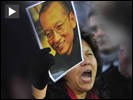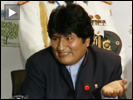China, US lead merry dance in Cancun By
Peter Lee
The climate change crisis is about a comma. It is also about a lack of global leadership by the United States and China.
The latest round of climate talks, now ending in the Mexican beach resort of Cancun, is trudging along towards the usual dispiriting conclusion. Beneath the blame-shifting and posturing, there is actually a shared understanding between many of the world's developed and developing economic powerhouses that the Kyoto Treaty is virtually dead - although many countries are loath to take the politically brutal step of admitting it.
Supposedly, Kyoto - the international agreement to keep carbon emissions down - is being replaced by a fairer mechanism called the Long-term Cooperative Agreement, or LCA. Actually, it is being replaced by awareness that the easiest way to deal with global warming is insulation; the kind of insulation that is best provided by a thick, reassuring pile of money.
The richer, economically more vigorous countries will invest in measures that protect them from the deleterious effects of global warming and even allow them to profit from it.
The poorer and more vulnerable nations will have less recourse to the United Nations and its ideas of global equity; they will have to find ways to leverage their diplomatic and economic utility to the richer nations if they want help with their climate change problems.
Japan provided a jolt of excitement to the proceedings in Mexico - the successor conference to the spectacular diplomatic train wreck of the Copenhagen Conference on Climate Change in 2009 - with its announcement that it would not sign on to an extension of the Kyoto Treaty when it expires in 2012 unless the BASIC block (primarily China and India) signed on to binding emissions targets.
Japan is an unlikely bomb-thrower in international venues. It has adopted a "plague on both their houses" attitude toward the two major non-participants in Kyoto, the US and China, as justification for scrapping the treaty.
However, it seems more likely Japan is probably acting as a proxy for the United States and for the developed countries that are profoundly dissatisfied with the Kyoto-mandated division of Annex I nations (European countries and Japan, with binding emissions reduction targets) and the Annex II nations (China, India, Brazil, et al, with no hard targets).
The United States never ratified the Kyoto Protocol, so it has limited diplomatic or moral standing to call for the protocol's overthrow. The EU had its shot at Copenhagen, when it circulated a widely vilified draft document calling for a post-Kyoto reordering of the climate change process. It is now apparently resigned to Kyoto's continuation. Canada repudiated its Kyoto targets when Stephen Harper took power last year. That leaves Japan, Australia, and Russia to take the lead.
Apparently Japan - which is locked into an increasingly zero-sum economic struggle with China - was most willing to step up.
China, on the other hand, has been on its best behavior at Cancun. The Beijing leadership remembers how it was excoriated, somewhat unfairly, for the virtual collapse of the Copenhagen conference.
At Cancun, it brought friendly faces, glossy brochures, and a willingness to say the right things - up to a point. In a widely-quoted (and somewhat garbled) article, Reuters reported:
China on Monday offered for the first time to submit its voluntary carbon emissions target to a binding UN resolution..."
China's target would still be voluntary, stressed China's chief negotiator Xie Zhenhua, a distinction from developed nation targets under Kyoto: "Developing countries can ... make their own voluntary emissions commitments and these should be under the Convention."
The November 29 to December 10 talks in Cancun are split over how to harden existing pledges made at last year's Copenhagen summit, which ended in a brief, non-binding agreement.
China's offer to make its existing, domestic pledge to slow growth in carbon emissions binding under a UN resolution is a compromise it hopes will encourage developed countries to continue the existing Kyoto Protocol.
"We can create a resolution and that resolution can be binding on China," said Huang Huikang, the Chinese Foreign Ministry's envoy for climate change talks. "Under the [UN Climate] Convention, we can even have a legally binding decision. We can discuss the specific form. We can make our efforts a part of international efforts.
"We're willing to compromise, we're willing to play a positive and constructive role, but on this issue [Kyoto] there's no room for compromise." [1]
The US sneered: "We've seen quotes from some people saying this can be a game-changer," Todd Stern, the lead US envoy at the UN talks in Cancun, said at a briefing. "I'd love it to be a game-changer, but as far as I'm concerned, this is business as usual." [2]
One has the definite impression that some Annex I countries plus the United States sent Japan out to drive a stake through the heart of Kyoto, lest it be revived by an ostentatious show of Chinese reasonableness.
US climate diplomacy is less than edifying. In its most practical aspect, it seems designed primarily to ensure that China and India are unable to successfully advance initiatives that might contribute to Kyoto's continued viability.
The famous comma referred to above was inserted by the George W Bush administration - normally not deeply engaged with questions of punctuation or climate change - into a seemingly innocuous phrase of the "Bali Roadmap", which was intended to help lead Kyoto out of its Annex I vs Annex II cul-de-sac.
India's Economic Times reported:
The Bali paragraph says treaty talks should yield "nationally appropriate" actions by developing countries to curb emissions "in the context of sustainable development, supported and enabled by technology, financing and capacity-building, in a measurable, reportable and verifiable manner."
The comma after "building" was dropped and then reinserted at the Bush administration's insistence. Delegates from the US argued for the comma to be inserted so that "actions" by developing countries and not just support from industrialized nations, would be measurable, reportable and verifiable, or MRV in UN jargon. [3]
MRV, especially the V for Verification part, is at the heart of climate change squabbles between China and the United States.
The United States professes anxiety that, without third-party verification of China's climate change mitigation efforts, China might be tempted to cheat. If China's opportunities for misbehavior are not explicitly and forcefully foreclosed, the argument goes, the possibility of getting meaningful climate change legislation through the US Congress is impossible.
China, on the other hand, professes anxiety that third-party MRV will (a) compromise Chinese sovereignty by giving a potentially hostile organization the opportunity to inject itself into China's climate change activities in an adversarial way (think of the IAEA under Amano vs Iran), and (b) turn China's voluntary targets into de facto mandatory targets by (c) providing a pretext for China-bashers to institute punitive import duties on Chinese goods if Chinese efforts to control greenhouse gas emissions are not considered up to snuff.
On balance, the Chinese arguments are more persuasive.
Right-wing intransigence, not China's imputed tendency to fudge data, is the apparently immovable and permanent obstacle to US domestic climate change legislation. Using norm-based multilateral initiatives to create problems for China, on the other hand, is apparently an irresistible attraction to US diplomats and legislators on issues as diverse as Iran, North Korea, and the South China Sea, and could presumably be deployed on the issue of China's carbon-spewing behavior.
At Cancun, in what was apparently an effort to placate the United States and avoid standing unambiguously with China (as it did post-Copenhagen), India's representative, Jairam Ramesh, floated the idea of a modified unintrusive MRV he called ICA - International Consultation and Analysis - and a qualified commitment to internationally monitored hard emission targets. The Times of India tells us:
The UPA had committed to Parliament that India would not take on any international legally binding commitments to reduce greenhouse emissions. It was also part of the Cabinet decision drawing a clear red line against such a move.
Last Thursday, Cabinet approved a proposal, mooted by Ramesh, diluting the line. It stated, "India will not take any international legally binding agreement, (at the moment)." This opened the window for Ramesh to shift India's position with his statement, suggesting that while India would not take on commitments right now, it could do so in the future. [4]
Whether China agrees with the Times of India that this is a "tectonic shift" is open to question. Under suitable circumstances, India's positions are probably acceptable to China.
As the West stumbles and China and India soar through the global recession, the free ride for Annex II countries is no longer defensible as a matter of principle.
As for the MRV gap between the United States and China, it is apparently more a matter of politics and negotiating posture, primarily on the side of the United States, rather than rooted in the mundane details of data collection, analysis, reporting, and review.
The US and China have held continual meetings on MRV and it appears that there isn't too much practical difference between the two sides.
The Guardian reported a WikiLeaks cable with this exchange between the EU's top climate change official and the lead US negotiator:
[Connie] Hedegaard asks why the US did not agree with China and India on what she saw as acceptable measures to police future emissions cuts. "The question is whether they will honour that language," the cable quotes [Jonathan] Pershing as saying. [5]
The New York Times reported on December 8 that the Chinese are willing to reach an agreement, but the US is insisting on certain adversarial MRV elements that China, almost inevitably, finds unacceptable:
Those familiar with China's position say the government is eager to agree to certain principles - like that an international monitoring system should not be punitive or impinge on national sovereignty. But it doesn't want an expert panel to rigorously truth-squad its methods or numbers, or allow other countries to submit questions about the reports. America, meanwhile, won't approve agreements on avoiding deforestation, adaptation, technology transfer and other programs worth billions of dollars until it gets specific agreements from China on elements like having an expert review panel. [6]
In an interesting contrast to Copenhagen, Western reporting does not automatically cast China as the heavy on MRV. Just the opposite, in fact.
More from the New York Times:
Yet while the United States is casting China as the linchpin of the negotiations, there is anger aplenty at America inside the Moon Palace resort where talks are being held. Many say the United States is demanding compromise from others while bringing nothing to the negotiating table itself.
"I'm actually more concerned about the US's transparency," said Jennifer Morgan, who heads the World Resources Institute's climate and energy program.
One leading US analyst said every time countries make progress on an issue, the United States reminds countries that it might all mean nothing unless China agrees to transparency rules.
"The US is the problem here," the analyst said. "Everybody is so pissed off. Here we are with nothing back home, and acting like bullies."
Even if India is warily sidling away from the preferred Chinese negotiating stance on MRV, Ramesh has not yet taken the truly explosive step of abandoning Kyoto.
For the time being, at least, both India and China are still insisting on a continuation of the Kyoto regime; Ramesh called that demand "non-negotiable".
China and India were responding to the latest effort of the anti-Kyoto hardliners: advancing the alternative structure-in-embryo of the Long-term Cooperative Agreement, an inclusive venue for ancillary issues that they hope to repackage as an emissions agreement that eliminates the Annex I/Annex II structure.
This approach is strongly resisted by China and India; the other brothers in the BASIC acronym, Brazil and South Africa, are apparently less militant on the issue.
Not only would LCA revoke China and India's Annex II free-rider privileges.
By leveling the playing field, LCA would shift the focus - acknowledged by Kyoto - from the historical culpability of the West for pumping the majority of greenhouse gases into the atmosphere since the beginning of the Industrial Revolution. Most probably, this end-of-history approach would seek to saddle China - in 2010 the biggest greenhouse gas emitter and one of the world's most vigorous economy - with reduction obligations that China would consider excessive.
As part of the relentless campaign to kill Kyoto and create favorable conditions for LCA, the Western industrialized nations have exploited the split between the smaller, less-developed nations threatened by climate change, and the big BASIC countries that care more about per capita GDP growth than sea level in the Maldives, hoping to completely fracture the image of extensive Kyoto consensus and thereby hasten its demise.
The small nations are anxious for economic aid from the West to help with their climate-related and other problems. At Copenhagen, the United States crudely deployed promises of economic aid to vulnerable countries (coupled with the demand that China yield on MRV or the aid would not be given) in order to split the Group of 77 united negotiating front of less developed countries that China and India pretended to speak for.
Post-Copenhagen, the efforts continued.
WikiLeaks provided an insight into the horse-trading employed, with the Maldives, the most vociferous, creative, and desperate player of the disappearing-atoll card, leading the pack, as the Guardian reported:
Within two weeks of Copenhagen, the Maldives foreign minister, Ahmed Shaheed, wrote to the US secretary of state, Hillary Clinton, expressing eagerness to back it.
By 23 February 2010, the Maldives' ambassador-designate to the US, Abdul Ghafoor Mohamed, told the US deputy climate change envoy, Jonathan Pershing, his country wanted "tangible assistance", saying other nations would then realise "the advantages to be gained by compliance" with the accord.
A diplomatic dance ensued. "Ghafoor referred to several projects costing approximately $50m (ฃ30m). Pershing encouraged him to provide concrete examples and costs in order to increase the likelihood of bilateral assistance."
The Maldives were unusual among developing countries in embracing the accord so wholeheartedly, but other small island nations were secretly seen as vulnerable to financial pressure. Any linking of the billions of dollars of aid to political support is extremely controversial - nations most threatened by climate change see the aid as a right, not a reward, and such a link as heretical. But on 11 February, Pershing met the EU climate action commissioner, Connie Hedegaard, in Brussels, where she told him, according to a cable, "the Aosis [Alliance of Small Island States] countries 'could be our best allies' given their need for financing". [7]
It is not clear if the Maldives have received their payout yet.
But Maldives President Mohamed Nasheed delivered on the eve of Cancun:
Mohamed Nasheed is the president of the Maldives, a group of low-lying islands in the Indian Ocean that will be among the first to vanish as the sea-level rises in a warming world. That's why he is so outspoken in challenging the current negotiating position of the developing countries.
"When I started hearing about this climate change issue, I started hearing developing countries say 'we have a right to emit carbon because we have to develop,' " he told the BBC recently. "It is true, we need to develop; but equating development to carbon emissions I thought was quite silly."
That is heresy, for the standard position of the group of developing countries (G-77) is that since the rich countries caused the problem, they must make the emissions cuts that would stop it. [8]
China's chief climate envoy, Xie Zhenhua, took the high road. According to the Global Times, he opined stolidly:
"Countries and people involved in the information that WikiLeaks released should reflect upon their deeds, if the information is true," Xie said. [9]
According to author Gwynne Dyer, around 30 nations of the G-77 share Nasheed's view. [10]
Though the United States may be able to deploy sufficient financial incentives to satisfy eager client atolls, it apparently lacks the will and muscle to stump up the cash for a deep and sustained effort to help the poorer nations of the world adapt to climate change.
This is a problem of practical as well as symbolic importance. US sincerity on the issue of binding emissions commitment has been suspect from the very beginning - rejection of Kyoto - to the present - the collapse of domestic carbon legislation in the US Congress.
If the US is going to lead a march to a level-playing-field emissions regime under LCA - which implies some significant burden-shifting away from the US and onto China's shoulders - America would be expected to compensate for its historical greenhouse gas legacy with significant aid to vulnerable states for adaptation, and transfer of carbon mitigation and energy conservation technologies to have-not states.
China and India have seized upon Western shortcomings in cash and technology and highlighted them by declaring that concrete action by the developed countries on these two commitments - along with continuation of Kyoto - as their three "non-negotiable demands".
Instead of delivering the cash, the West has spewed vapor while shifting money from other aid programs and providing loan guarantees instead of grants.
China clearly sees this as an opportunity to point out that Western underperformance - and not Chinese intransigence on the largely manufactured issue of verification - is what the developing world should really be worried about.
China's climate change honcho, Xie Zhenhua, claimed that on the eve on Cancun only $5 billion of the pledged $30 billion was in place as actual, new cash. In an interview with an environmental website, chinadialogue, Xie stated with an unctuous show of sympathy "that China understands the economic crisis many nations are facing and is not criticising this". [11]
The recession also casts a shadow on the other Western effort to control the global climate control process with its wallet: the pledge to transfer $100 billion a year in long-term climate mitigation funding to developing countries by 2020, in the Atlantic's opinion:
However, fiscal austerity measures in industrialized countries and ongoing economic stagnation will limit the ability to tap either public or private sources of financing. Proposals for raising money through carbon levies on certain global industries like shipping and aviation are not likely to amount to anything. [12]
BASIC seized on reports that the West wanted to pull control of the funding from the UN - the only organization that makes even a token effort to stand up for the world's dispossessed - and put it in the hands of the grantors.
According to the Times of India, a vociferous defender of the classic BASIC line on Kyoto:
The G20 has now stepped in to strip the UN Framework Convention on Climate Change further of any substantial worth.
The G20 has told member countries that the issues of financing climate change action be taken out of the UN talks and be handed over to them. The move could further demolish the consensus-driven process within the UN talks and potentially rob the climate change convention of any worth to the developing countries that have seen little real money despite commitments and promises by the rich countries.
The G20 has asked member countries that they allow the finance ministries under the aegis of this umbrella devise the Green Fund that the Copenhagen Accord had envisaged. ...
The developing countries are keen that the fund be managed democratically under the UNFCCC where all countries get an equal vote and equal weight. The US and other countries prefer to set up the fund in a way they can control the flow as contributors to the fund. The developing countries have demanded a greater say in finalising how the funds would be spent based on their needs and priorities, if and when they materialise.
The attempt by G20 to hijack the Green Fund proposal, while the developed countries block it in the UN negotiations, would lead to details of the critical component of the expected global deal being instead finalised in a body dominated by developed country interests and then being imposed on the 193 country UNFCCC. [13]
Stripped of meaningful assurances of Western funding to compensate for historical responsibility for generation of greenhouse gases, LCA looks like little more than burden-shifting to China.
At the same time, China has amassed a relatively stellar record on carbon intensity and emissions-related progress in comparison to the United States.
As Bloomberg put it:
"It used to be thought that China wouldn't act until the U.S. took leadership," Mark Fulton, a managing director at Deutsche Bank Climate Change Advisors in New York, said in an interview. "But unless I've missed something, China has already taken substantial action." ...
"China is in a stronger negotiating position now than they were in Copenhagen because the perception is the US doesn't have its domestic act together," Alden Meyer, head of policy in Washington at the Union of Concerned Scientists, said in an interview. "The Chinese public believes they are doing a lot more on the ground than the US, and they don't think China should have to make any concessions." [14]
Therefore, a more confident and assertive China may be willing to put up with what it considers to be hypocritical pummeling from the West for its insistence on Kyoto.
Beneath the apparent international united front dedicated to eliminating the anachronistic Annex I/Annex II dichotomy, there is probably a certain understanding of the Chinese position.
As far as Europe - the lonely mainstay of genuine global efforts to control greenhouse gases - is concerned, a possible alternative to Kyoto is not LCA; it is bilateral engagement with China to perpetuate the emissions control and carbon trading regime already conducted by the EU with China, India, and other developing countries through the Clean Development Mechanism, and compel the United States - which apparently lacks the ability to lead - to follow the two blocs into a new regime:
A number of analysts have called for closer EU-China co-operation in recent weeks however, including Chatham House energy research director, Bernice Lee.
"With the collapse of climate legislation in the US, it is up to the EU and China as the world's largest markets for low-carbon goods and services to strengthen their role as the locomotive of the low-carbon economy," he wrote in a paper last month.
Environmental groups also agree a Sino-EU alliance would have advantages. "The biggest emitters - China and the US - are the biggest players," WWF climate activist Jason Anderson told this website. "The key question at the moment is how to bring pressure on the US." [15]
There is not a great deal of downside to insisting on Kyoto if LCA if the nations of the world perceive as no more than a taunting mirage.
Without active US leadership to give meaning to the LCA process, Kyoto is the best that the world has got.
Post-Cancun, the world faces the certainty that China and India will not decrease emissions; the likelihood that the United States will not achieve significant reductions, either by treaty or through domestic regulation or legislation; the futility of the EU and Japan trying to carry the weight of game-changing emissions reductions on their shoulders; and the near certainty that greenhouse gas targets will be missed and the world is in for major climate change.
It seems to make very little difference if the Kyoto can is kicked down the road a few more years, or simply kicked aside.
Notes 1.
China buoys climate talks with "binding" target, Yahoo, Dec 6, 2010.
2.
U.S. Sees No `Game-Changer' in China's Pledges at UN Global Warming Talks, Bloomberg, Dec 7, 2010.
3.
'Famous comma' slows climate talks, Economic Times, Dec 18, 2009.
4.
India can pledge binding emission cuts, says Jairam Ramesh, Times of India, Dec 10, 2010.
5.
WikiLeaks cables reveal how US manipulated climate accord, Guardian, Dec 3, 2010.
6.
U.S. and China Maintain Polite Disagreement as Climate Talks Reach Final Days, New York Times, Dec 8, 2010.
7.
WikiLeaks cables reveal how US manipulated climate accord, Guardian, Dec 3, 2010.
8.
No emissions deal at Cancun, Japan Times, Dec 9, 2010.
9.
BASIC nations stand firm, Global times, Dec 8, 2010.
10.
No emissions deal at Cancun, Japan Times, Dec 9, 2010.
11.
"China will be transparent", China Dialogue, Nov 29, 2010.
12.
What to Expect at the Cancun Climate Talks, The Atlantic, Nov 29, 2010.
13.
Climate change: G20 wants financing out of UN talks, Times of India, Dec 9, 2010.
14.
China Turns Negotiating Tables on U.S. at Stalled Cancun Climate Meeting, Bloomberg, Dec 4, 2010.
15.
EU downplays chance of climate alliance with China, EU Observer, Nov 29, 2010.
Peter Lee writes on East and South Asian affairs and their intersection with US foreign policy. (Copyright 2010 Asia Times Online (Holdings) Ltd. All rights reserved. Please contact us about
sales, syndication and
republishing.)








 The Nobel Committee’s decision to award Liu Xiaobo has enraged the Chinese government. In Cancún, Chinese climate negotiators reportedly refused to talk with their Norwegian counterparts. We discuss China’s reaction to Xiaobo’s award and its role at the climate talks with Lucia Green-Weiskel of the Beijing-based Innovation Center for Energy and Transportation.
The Nobel Committee’s decision to award Liu Xiaobo has enraged the Chinese government. In Cancún, Chinese climate negotiators reportedly refused to talk with their Norwegian counterparts. We discuss China’s reaction to Xiaobo’s award and its role at the climate talks with Lucia Green-Weiskel of the Beijing-based Innovation Center for Energy and Transportation.

















